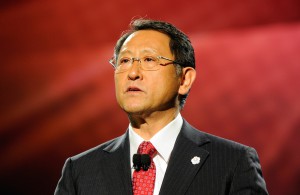
Toyota's CEO Akio Toyoda announced a profitable quarter for the automaker, then the company announced its new $170 million engine plant in Brazil.
Toyota, which Wednesday announced yet another record annual profit, has opened a new engine manufacturing plant in Brazil that it hopes will bolster the automaker’s operations throughout Latin America.
But the debut of the new factory comes at an unusually tough time for the Japanese giant. Even while earning a record $21 billion for the fiscal year that ended March 31, Toyota warned it would see as much as a 35% decline in the coming fiscal year. And one reason is weak sales in Latin America.
Things have gotten particularly dire in Brazil, a country in the midst of its worst recession in decades, as well as a political upheaval that is considered increasingly likely to result in the ouster of its embattled president.
Nonetheless, Toyota officials tried to put a positive spin on the opening of the new Brazilian plant, which cost $170 million and employs 320.
Besides supporting Toyota operations across Latin America and the Caribbean region, it also underscores Toyota’s long-term commitment to Brazil, which has been mired in a recession for more than a year and is now engulfed in political turmoil, officials said.
(Toyota earnings up, but outlook breaking going forward. For more, Click Here.)
Not everyone is upbeat. An analysis by BMI cautioned that the Brazilian market “has taken a small step backwards towards the drop into the ‘high risk’ half of the matrix, as the ongoing political turmoil in the country, itself an indicator of higher risk, has prompted a downward revision of our sales forecast for the year.”
Toyota, however, isn’t the only company betting on a future recovery in Brazil.
Last month, Fiat Chrysler Automobiles NV dedicated its $2.4 billion plant in Pernambuco, Brazil, which is set to build Jeep-brand vehicles, including the upcoming replacement for its Compass and Patriot models. FCA is so confident about the prospects, it will debut the model in Brazil later this year.
(U.S. car sales running at record levels. Click Here for the story.)
Fiat Chrysler has described the Pernambuco plant as its most-advanced, as well as its first “truly global plant,” which was planned and executed from the ground up by an intercultural team.
“In my decades of international experience, the revolution here in Pernambuco is the most profound I have ever seen,” FCA chief executive Sergio Marchionne said in a statement. “It began five years ago when we had the vision of creating one of the most competitive plants in the world in the middle of a stretch of sugar cane fields. Then step by step, the people here made it a reality,” he said.
Besides helping protect Fiat’s position as the top automaker in Brazil from competition from General Motors and Toyota, the new plant is part of FCA’s plan to expand the global reach of the Jeep brand.
(To see more about FCA’s plans to build Jeep products in Brazil, Click Here.)
The FCA complex in Brazil represents an investment $2.4 billion, including $1 billion for the Jeep assembly plant, $681 million for the supplier park and another 2 $681 million for product development and other investments.
(Paul A. Eisenstein contributed to this report.)

Timing seems off, sort of like those 15-year retail car loans Chevrolet’s been peddling in Colombia.